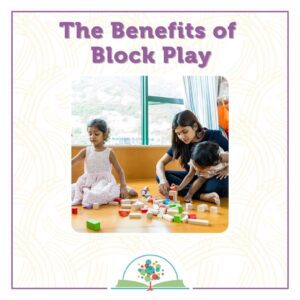14 Mar Benefits of Block Play
Building blocks are a fundamental part of childhood play and development for many families but there are benefits to block play that go far beyond just stacking and building. Educational research shows promising advantages to using blocks during play for improving reading skills such as print awareness, vocabulary development, and written expression. We will expand on these areas and provide realistic strategies for parents and caregivers to improve their child’s reading skills using building blocks.
Print Awareness
Children begin to connect words and symbols to activities, objects, toys, and materials alike. When it comes to block play, many children identify letters printed on blocks as a way to learn the alphabet. Even when blocks do not have letters, print awareness can be developed during block play through the use of related books, storage labels, toy instructions, and building guides.
Caregiver Tip
When engaging children in block play, try placing books or other reading materials in the area to spark their natural curiosity and exploration. If you have different types of blocks for play, consider labeling their containers to specify their differences – you may see that your child will show a preference for a certain kind of block and the labels can help them identify their favorites. For groups of children, simple signs and symbols can reinforce rules and expectations for block play to promote both safety and cooperation.
Vocabulary Development
Children learn vocabulary at a swift rate and this is especially true during play as they begin to engage in conversations with caregivers and peers. During block play a child’s vocabulary is improved through identifying shapes, colors, and problem solving.
Caregiver Tip
Have conversations as your child builds with blocks. Actively reflect on what steps a child takes when building. Offer advice when blocks inevitably fall over. Ask clarifying questions about what the child is building and what the purpose of those buildings are such as schools, stores, and homes.
Written Expression
When children are engaged in play, it may not be immediately apparent that writing skills are being affected. However, in addition to developing gross and fine motor skills that later help children hold a pen or pencil, children are also learning how to express themselves and communicate ideas. These early literacy skills are foundational for future writing skills.
Caregiver Tip
Enrich your child’s block play by providing materials such as pencils and paper. Encourage your child to create their own signs that they might see in real life such as stop signs. They can also create pictures that expand upon their builds such as drawing trees to create a neighborhood or a park.
Source: https://www.basicknowledge101.com/pdf/Using_Block_Play.pdf
Related Reads
Whether your child is reading independently or is still in the beginning stages of early literacy, using building blocks during play helps improve reading development in many ways. Not only are blocks fun and engaging for young children, they are a great way for caregivers to connect and see their children actively learn in real time. Next time you and your child use block play, consider the tips above and adapt them to the developmental needs of your child. Happy reading!




